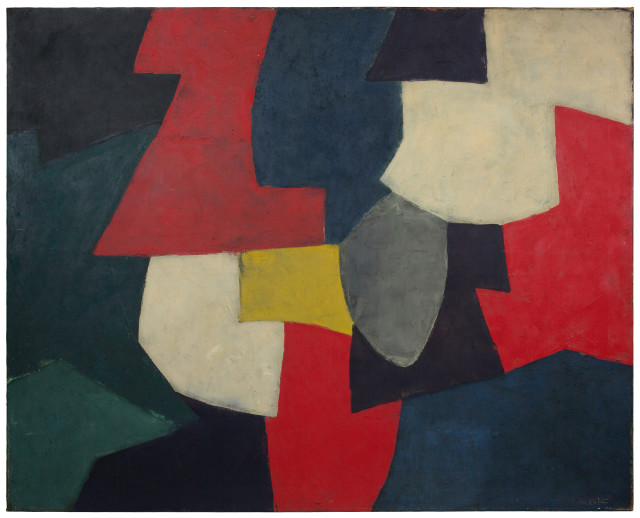- FR
S’inscrire
- Acheter
- Vendre
- Plus
- Galerie
- Commerce d'art
- Maison d'Édition
- Kornfeld aujourd’hui
- L'histoire de la Maison
- Informations





Moskau 1906 - 1969 Paris
1959
Oil and sand on canvas
129,5x162 cm
Lower right incised by the artist in red "Serge Poliakoff", on the verso of the chassis signed again by the artist in black crayon "Serge Poliakoff"
Alexis Poliakoff, Serge Poliakoff, Catalogue raisonné, vol. III, 1959-1962, München 2011, no. 59-25, reprod. in colours
Registered in the Archives Serge Poliakoff under the number "959053"
Charpentier Gallery, Paris
The Hanover Gallery, London, label and number "G.157/19" on the reverse
Collection Erika Brausen, London
Gallery Gimpel & Hanover , Zurich
Collection Sonja and Hugo Koblet, Zurich
Auction Germann, Zurich, 9.11.1983, cat. no. 50, reprod.
Max Keel Collection, Zollikon
Thomas Ammann Fine Art, Zurich, label on reverse
Barr & Ochsner Fine Art, Zurich
Private collection, Zurich
Paris 1958, Galerie Charpentier, École de Paris, cat. no. 112, reprod.
London 1962, The Hanover Gallery, Arp, Dubuffet, Fautrier, Giacometti et alt., cat. no. 17, reprod.
Zurich 1963, Galerie Gimpel & Hanover, Gruppenausstellung, cat. no. 36, reprod.
London 1964, The Tate Gallery, Decade 54-64, cat. no. 112, reprod.
London 1967, The Hanover Gallery, Contrasts, cat. no. 52, reprod.
Colmar 1971, Musée d'Unterlinden, Serge Poliakoff, cat. no. 20
Köln 2003, Galerie Gmurzynska, From Russia with Love
On the original stretcher, in the original mounting. Fine craquelure in red and yellow, minimal rubbing at the edges, covered by the frame. In impeccable condition
Poliakoff is considered one of the most important representatives of the "École de Paris" and developed a very independent form of abstract painting. He successively expanded his range of colours to include luminous, sometimes minimally contrasting tones. The paintings from the late 1950s are rightly regarded as highlights in Poliakoff's oeuvre. The artist was exhibited in many renowned museums and galleries in Europe and the USA and was also a participant in "documenta II" (1959) and documenta III (1964) in Kassel
The work offered here, which has been privately owned in Switzerland for a long time, is probably one of the most impressive examples of Poliakoff's art. It is one of the rare, monumental large formats and impresses with nuanced, balanced colour tones that create a wonderfully harmonious overall impression. The artist usually mixed his colours himself from pigments, often mixed with sand. This creates a velvety surface structure in individual colour fields and leads to an impressive interplay of colour, forms and structure
1959
Öl und Sand auf Leinwand
129,5x162 cm
Unten rechts vom Künstler in Rot eingeritzt "Serge Poliakoff", verso auf dem Chassis vom Künstler in schwarzem Farbstift noch einmal signiert "Serge Poliakoff"
Alexis Poliakoff, Serge Poliakoff, Catalogue raisonné, Bd. III, 1959-1962, München 2011, Nr. 59-25, reprod. in Farben
Eingetragen in den Archives Serge Poliakoff unter der Nummer "959053"
Galerie Charpentier, Paris
The Hanover Gallery, London, rückseitig mit Etikett und der Nummer "G.157/19"
Slg. Erika Brausen, London
Galerie Gimpel & Hanover , Zürich
Slg. Sonja und Hugo Koblet, Zürich
Auktion Germann, Zürich, 9.11.1983,
Slg. Max Keel, Zollikon
Thomas Ammann Fine Art, Zürich, rückseitig mit Etikett
Barr & Ochsner Fine Art, Zürich
Privatsammlung, Zürich
Paris 1958, Galerie Charpentier, École de Paris,
London 1962, The Hanover Gallery, Arp, Dubuffet, Fautrier, Giacometti et alt.,
Zürich 1963, Galerie Gimpel & Hanover, Gruppenausstellung,
London 1964, The Tate Gallery, Decade 54-64,
London 1967, The Hanover Gallery, Contrasts,
Colmar 1971, Musée d'Unterlinden, Serge Poliakoff,
Köln 2003, Galerie Gmurzynska, From Russia with Love
Auf dem originalen Chassis, in der originalen Nagelung. Feine Krakelüren im Rot und Gelb, minimale Abreibungen an den Rändern, vom Rahmen verdeckt. In tadelloser Erhaltung
Poliakoff gilt als einer der wichtigsten Vertreter der "École de Paris" und entwickelte eine sehr eigenständige Form abstrakter Malerei. Sukzessive erweiterte er seine Farbskala um leuchtende, manchmal minimal gegeneinander abgesetzte Töne. Die Gemälde aus den späten 1950er Jahren gelten zu Recht als Höhepunkte im Schaffen Poliakoffs. Der Künstler war in vielen namhaften Museen und Galerien in Europa und den USA zu sehen und war auch Teilnehmer an der "documenta II" (1959) und der documenta III (1964) in Kassel
Das hier angebotene Werk, das sich seit langem in Schweizer Privatbesitz befindet, ist wohl eines der eindrücklichsten Beispiele von Poliakoffs Kunst. Es gehört zu den seltenen, monumentalen Grossformaten und beeindruckt durch nuanciert aufeinander abgewogene Farbklänge, die einen wunderbar harmonischen Gesamteindruck entstehen lassen. Der Künstler mischte seine Farben meistens selber aus Pigmenten zusammen, oft versetzt mit Sand. Das erzeugt bei einzelnen Farbfeldern eine samtene Oberflächenstruktur und führt zu einem eindrücklichen Wechselspiel von Farbe, Formen und Struktur






